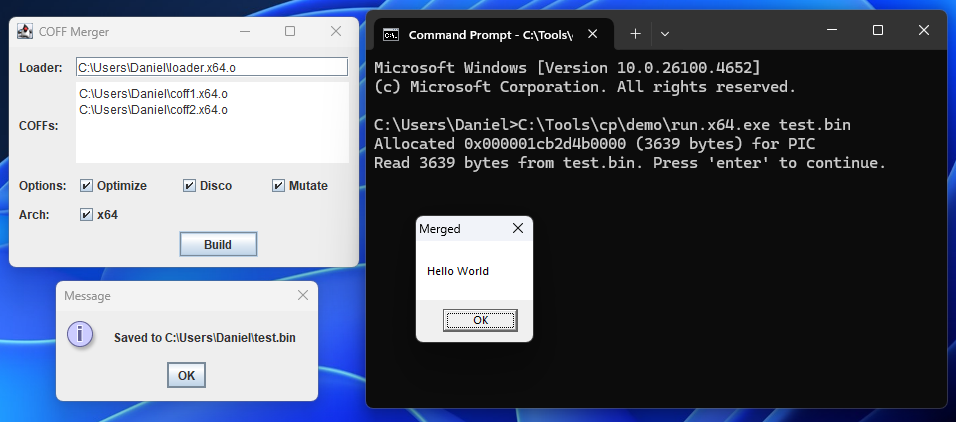Crystal Palace provides two command-line tools, called link and piclink, which are used with a specification file to combine a reflective loader with one or more capabilities (DLLs and/or COFFs).
link takes the path to a spec file, the path to a DLL or COFF, and outputs PIC:
./link [/path/to/loader.spec] [/path/to/file.dll|file.o] [out.bin]This is suitable for building a single capability using the $VAR syntax in the spec, e.g:
x64:
load "bin/loader.x64.o"
make pic
push $DLL
link "my_data"
exportpiclink is similar but it doesn't take the path to a capability. It relies on them being defined in the spec, e.g:
x64:
load "bin/loader.x64.o"
make pic
load "bin/coff.x64.o"
make object
export
link "my_data"
exportThe Crystal Palace JAR archive exposes an API designed for external programs to apply specifications. The only class that's documented is the LinkSpec. The idea is to call the static Parse method with the path to a spec file, and then the instance'd run method to produce the PIC. For example:
import crystalpalace.spec.*;
import crystalpalace.util.*;
...
var spec = LinkSpec.Parse("/path/to/spec");
var capability = CrystalUtils.readFromFile("/path/to/capability");
var args = new HashMap();
var pic = spec.run(capability, args);💡
Under the hood, run looks at the MZ header of the provided capability and calls runDll if it's a DLL and runObject if it's a COFF. Furthermore, runDll automatically adds "$DLL" to the argument HashMap and runObject adds "$OBJECT". That's why these variables work in spec files without you needing to provide them explicity in a HashMap, or with the link tool.
Pretty simple really - and quite easy to replicate what the CLI tools do.
However, I wanted to explore the possibility of using/abusing the API to create PIC without a pre-defined spec file. To that end, I wrote a basic "COFF Merger" app:

This merges the provided COFFs and combines them with the provided loader (basically what I wrote about in the last post). It also allows you to toggle the link-time optimization, function order randomization, and code mutator options. The output is obviously a PIC blob that can be injected into a process.
Even though it's not documented, the SpecParser class (which is what LinkSpec.Parse uses to parse a specification file) is set to public and allows you to pass raw specification content, rather than the path to a specification file. A SpecParser instance also has a getSpec method, which returns a functional LinkSpec.
var content = "...";
var parser = new SpecParser();
parser.parse(content, "foobar.spec");
var spec = parser.getSpec();
var args = new HashMap();
var pic = spec.buildPic("x64", args);The buildPic method also differs from run as it doesn't attempt to check what capabilities are being provided, and therefore doesn't add anything to the HashMap for you.
To build the actual specification content, I just used a StringBuilder based on the values populated in the UI:
var arch = x64CheckBox.isSelected() ? "x64" : "x86";
var sb = new StringBuilder();
sb.append(arch).append(":\n");
// reflective loader
sb.append("push $LOADER\n");
sb.append("make pic\n");
// coffs
var coffPaths = coffList.getText().split("\n");
// push the first coff
sb.append("push $COFF0\n");
// create coff exporter
sb.append("make coff\n");
// merge the remaining coffs
for (int i = 1; i < coffPaths.length; i++) {
sb.append("push $COFF").append(i).append("\n");
sb.append("merge\n");
}
// export them
sb.append("export\n");
// now turn merged coffs into a pico
sb.append("make object");
// add any optimizations
if (optimizeCheckBox.isSelected())
sb.append(" +optimize");
if (discoCheckBox.isSelected())
sb.append(" +disco");
if (mutateCheckBox.isSelected())
sb.append(" +mutate");
sb.append("\n");
// export pico and link to reflective loader
sb.append("export\n");
sb.append("link \"merged_pico\"\n");
// export the lot
sb.append("export");
var content = sb.toString();This produces a string that looks something like this:
x64:
push $LOADER
make pic
push $COFF0
make coff
push $COFF1
merge
export
make object +optimize +disco +mutate
export
link "merged_pico"
export💡
Fortunately, Crystal Palace is not sensitive to indenting.
After parsing the above spec, we need to populate the HashMap with the $LOADER and $COFF variables. This needs to be the raw bytes of each file.
var args = new HashMap();
// read the loader
args.put("$LOADER", CrystalUtils.readFromFile(loaderPath.getText()));
// read each coff
for (int i = 0; i < coffPaths.length; i++) {
args.put("$COFF" + i, CrystalUtils.readFromFile(coffPaths[i]));
}
// build the pic
var pic = spec.buildPic(arch, args);Testing the output with run.x64.exe shows that it worked as expected.

Closing
I have no idea if the SpecParser class being public is by design or just an oversight. Given that only LinkSpec has published documentation, I assume it's the only intended way to use the API, rather than what I have written here. It would be cool if there was a "SpecBuilder" class that provided a fluent API to build the spec without parsing string commands. Maybe something like:
var builder = new SpecBuilder();
builder.push("$LOADER");
builder.makePic().optimize();
builder.push("$COFF");
builder.makeObject().optimize().disco().mutate();
builder.export();
builder.link("my_data");
builder.export();
var spec = builder.toSpec();
var args = new HashMap();
args.put("$LOADER", [loader bytes]);
args.put("$COFF", [coff bytes]);
var pic = spec.buildPic("x64", args);But perhaps this is straying into use-cases that CP isn't intended to accomodate and that I have nothing better to do on a Sunday afternoon...
